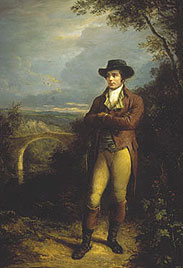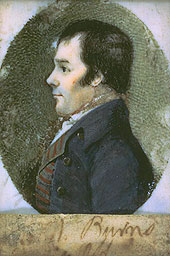Robert Burns at 250:
Poetry, Politics & Performance
Symposium: February 24-25, 2009
About Robert Burns
 |

Portrait of Robert Burns by Alexander Nasmyth, 1828. Although painted 32 years after the poet’s death, it was based on a portrait Nasmyth had painted from life. Courtesy, National Library of Scotland. |
|
 |
More than a poet, Robert Burns has served as an icon and inspiration for generations of artists, politicians, social activists, and cultural reformers throughout the world. The 250th anniversary of his birth provides an ideal opportunity for the Library of Congress, in collaboration with the Scottish Government, to present a public symposium celebrating his life and work, and exploring his impact on America and American culture.
Robert Burns was born in Alloway, near Ayr, in southwestern Scotland, on January 25, 1759. He was the eldest of the seven children of William Burnes, a tenant farmer, and his wife Agnes Broun. Growing up in poverty with little formal schooling, he nevertheless received a solid education, from his father and several local tutors, in subjects that included French, Latin and mathematics. He began writing poetry and song lyrics at the age of fifteen. By twenty, following his family’s move to a farm near Tarbolton, he was active in a country dance society and several local clubs and lodges.
In 1786, at the urging of his brother Gilbert and some of his friends, Burns published his first volume of poetry, Poems, Chiefly in the Scottish Dialect, in Kilmarnock. The volume was an immediate critical success, and a second edition printed soon thereafter, in Edinburgh, proved a financial success. Burns was hailed and feted as a literary lion throughout Scotland. In the decade that followed, his works were published widely in books and periodicals. He contributed to compilations of Scottish songs and ballads, submitting his own original poems as well as verses based on traditional songs and poems collected from folk performers.
Few poets have moved as easily between the worlds of rural folk poetry and urban literary circles as Robert Burns. A talented poet in both Scots and English, Burns was also a dedicated collector of folk songs and tunes, an able musician, and a gifted lyricist. His career as a farmer proved less successful, and, in 1788, he accepted an appointment with the Customs and Excise service and moved to Ellisland. He moved again to Dumfries in 1791. Like many early folk song collectors, Burns felt free to adapt and “improve” traditional songs’ texts and melodies. He is credited with preserving more than 300 Scottish songs, often setting his own lyrics or traditional lyrics to new or revised tunes. He contributed hundreds of lyrics to publications, such as George Thompson’s A Select Collection of Original Scottish Airs for the Voice (1793) and James Johnson’s The Scots Musical Museum (1787-1797). Among his best known songs are "Auld Lang Syne," "Scots Wha Hae," and "Flow Gently Sweet Afton."
 |

Miniature portrait of Robert Burns by Alexander Reid, 1795. Burns described this as
"by far the best likeness of me ever was taken." From the collections of the Scottish National Portrait Gallery. |
|
 |
Burns wrote poetry in both Scots and English, and many of his most memorable works are a careful blend of the two. This made the poems widely accessible to both Scottish and English-speaking audiences, while retaining a character that was distinctly Scottish. The subject matter of his poems was remarkably broad and addressed topics as varied as politics, class inequality, Scottish nationalism, romance, religion, socializing, and social justice. His lyricism, his ability to appeal to varied audiences, and his short but colorful life served as an inspiration for Romantic poets and writers that followed in the next generation. The causes and concerns addressed by his poetry influenced — and continued to influence — artists, politicians, and activists in Scotland, America, and in numerous other countries throughout the world.
Burns died at Dumfries in 1796 at the tragically young age of 37. His birthday, January 25, is still celebrated throughout the world with "Burns Suppers," at which his life is remembered, his memory immortalized, his poems recited, and his lyrics enthusiastically sung.
|


